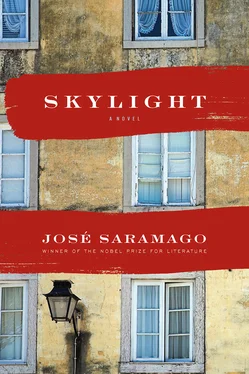The days passed slowly. The postal service had dispatched Carmen’s letters across the country and across the border. The replies were perhaps setting off along the same route on their return journey (perhaps, who knows, carried by the same hands). Each hour and each day brought them closer. Carmen did not even know what she was hoping for. Compassion? Kind words? Yes, that was what she needed. She would feel less alone when she read those words, as if she were once again surrounded by her own family. She could see their compassionate faces bent over her, instilling her with courage. That was all she could hope for, but perhaps because she had also written to Manolo, she was hoping for something more. The days passed. Her own intense need made her forget that her mother was never quick to answer letters, and that often weeks went by without her receiving a response. She feared she had been forgotten.
Tied to his routine as a salesman and seeing the day of his liberation moving ever further off, Emílio allowed the time to pass. He had announced that he would be leaving, but had taken not one step in that direction. His courage was failing him. As he stood poised on the threshold ready to leave and never come back, something held him there. Love had vanished from his home. He did not hate his wife, but he was weary of being unhappy. Everyone has his limits: he could bear a certain degree of unhappiness, but no more than that. And yet still he did not leave. His wife had stopped making those terrible scenes and had grown meek and quiet. She never raised her voice or complained about her wretched life. When he considered this, Emílio felt afraid that she might perhaps be trying to rebuild their home life. He already felt too trapped to want such a thing. On the other hand, he realized, Carmen spoke to him only when absolutely necessary, so there were little grounds for thinking she wanted a reconciliation. It was clear that she had managed to regain her son’s trust, but that was a very long way from wanting to win back her husband as well; no, that was a distance she seemed unwilling to travel. The transformation intrigued him, though. Henrique had resumed his close relationship with her, so why no more of those stormy scenes? When he asked himself this question and received no answer, Emílio would shrug his shoulders and surrender himself to time, as if time would give him the courage he lacked.
Then a letter arrived. Emílio was out, and Henrique had gone off on an errand. When she received the letter from the postman and recognized her mother’s handwriting, Carmen felt a kind of shudder run through her and asked:
“Are there no other letters for me?”
The postman looked through the bundle of letters he was holding and said:
“No, only that one.”
Only that one! Carmen felt like crying. She realized then that what she had been hoping for was a letter from Manolo. And that letter had not come. With a slowness that intrigued the postman, she closed the door. How foolish she had been! What had she been thinking! Had she been completely out of her mind when she wrote to her cousin? So deeply immersed was she in these thoughts that she quite forgot about her mother’s letter, until suddenly she became aware of the touch of paper on fingertips. She murmured in Galician:
“ Miña nai … Mother…”
She tore open the envelope. Two large sheets of paper, filled from top to bottom in the small, dense handwriting she knew so well. It was too dark in the corridor for her to read. She ran to the bedroom, turned on the light and sat down on the edge of the bed, and she did all this as urgently as if she were afraid the letter might dissolve in her hands. Her eyes were too filled with tears for her to be able to make out the words. She nervously wiped them away, blew her nose, and only then could she read what her mother had written.
She said exactly what Carmen had expected her to say. How much she regretted her situation, but that it was no fault of hers, because right from the start she had warned her against marrying that man. Carmen knew all this perfectly well, and had read the same words in other letters, but was that all her mother had to say? Nothing more? What else could she say? But wait, what was this?
There it was. Her mother was inviting her to leave Lisbon and spend some time with them. Two months, possibly three. She could bring Henrique with her. They would pay both their fares. It would be… well, Carmen didn’t know what it would be like. Her eyes again filled with tears and she could read no more. It would, of course, be a great source of happiness. Two months, perhaps three, far from this apartment, with her family, and with her son beside her.
She dried her eyes and read on: news about the house, the family, the birth of a nephew and, at the end, love and best wishes. In the margin, in smaller writing, was a postscript. The doorbell rang. Carmen didn’t hear it. It rang again. Carmen had now read those lines, but still heard nothing. The postscript explained everything: Manolo had asked her mother to say that he wouldn’t write now because he was looking forward to seeing her in Vigo. Once more the doorbell rang out: strident, impatient, urgent. As if she were returning from the end of time itself, Carmen finally heard the bell. She went to open the door. It was her son. Henrique was bewildered to find his mother crying and laughing at the same time. He found himself clasped in her arms, felt her kisses and heard her say:
“We’re going to see Grandpa Filipe and Grandma Mercedes, sweetheart, we’re going to spend some time with Grandpa and Grandma!”
When Emílio arrived that night, Carmen showed him the letter. He had never taken any interest in his wife’s correspondence and had the good taste not to go reading it when she wasn’t looking. Suspecting that the letters would be full of complaints and that he doubtless appeared in them in the role of tyrant, he had no desire to read them. And though Carmen wouldn’t have minded her husband knowing what her family said about him, she showed him only the part of the letter in which her mother mentioned the possibility of a visit: she needed his permission, and if he read the rest of the letter he might, out of pure spite, refuse. Emílio noticed that one margin had been cut off with scissors. He did not ask why. He handed back the letter and said nothing.
“So?” asked Carmen.
He did not reply at once. He saw stretching ahead of him two, possibly three months of solitude. He saw himself free and alone in the empty apartment. He could go out when he wanted, come back when he wanted, could choose to sleep where he wanted, on the floor or in the bed. He could see himself doing all the things he longed to do, so many that he could not, just then, think of a single one. His lips opened in a smile. From that moment, he began to feel free, felt the chains that bound him fall away. A large, full life awaited him, a life in which there would be room for all his dreams and all his hopes. It might only be three months, but what did that matter? Perhaps by then he would have screwed up enough courage to—
“So?” his wife asked again, sensing a refusal in his silence.
“Fine. Why not.”
Just three words. For the first time in many years, there were three contented people in that apartment. Henrique was excited at the prospect of a holiday, at riding on the clickety-clack train, excited, as any child would be, by the whole marvelous idea of a journey. For Emílio and for Carmen, it meant being liberated from the nightmare that bound them to each other.
Supper passed peacefully. There were smiles and friendly words. Henrique was happy. Even his parents seemed happy. The light in the kitchen seemed somehow brighter. Everything was brighter and purer.
Читать дальше












